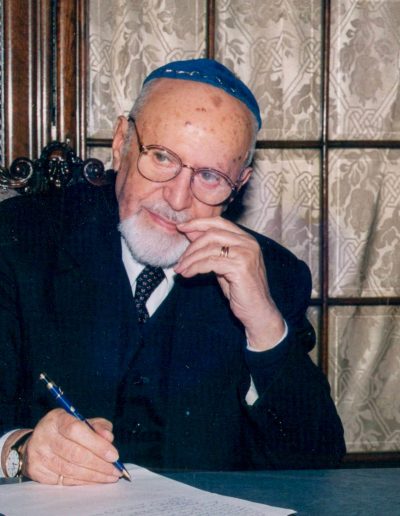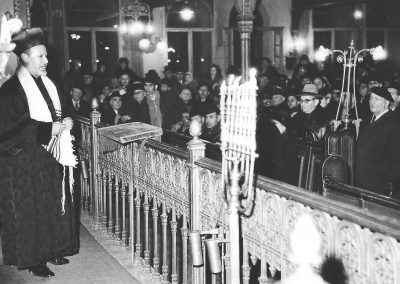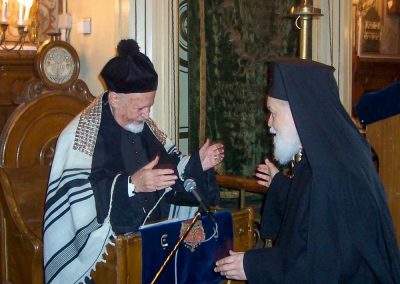Neumann Ernest
(b. January 12, 1917, Ceica village, Bihor county - d. April 21, 2004, TimișoaraRabbi and president of the Jewish Community of Timișoara
He was born on January 12, 1917 in Ceica (Bihor County), a Romanian village with a large Jewish community. The parents were employed at an oil mill, owned by an uncle, living in Oradea. From the age of 4 he frequented heder. From childhood he mastered Hungarian, Romanian, Yiddish and Hebrew, later mastered French, English and German.
He was a student at the Samuil Vulcan High School in Beiuș, then he studied between 1935-1940 at the Országos Rabiképzõ Intézet Budapest Higher Rabbinical Seminary Institute in Budapest, where the seminarian was also a student at the Pázmány Péter University of Sciences, of Philosophy, Semitic Languages and Oriental History. He had his doctoral dissertation entitled On the history of creation as reflected in our traditional teachings in 1940.
After completing his rabbinic studies in Budapest, starting with April 3, 1941, Dr. Ernest Neumann became an employee of the Jewish Community of Timisoara. Initially, he held two positions: he taught eight hours a week religion and history at the Israelite High School and also held the position of rabbi at the Status Quo Temple in Fabric, succeeding the first rabbi Jacob (Jakab) Singer (1867-1939). The first years of activity were difficult years, of great insecurity and fear, in which, apart from a brief interruption, when he was deported to a compulsory labor camp, the young rabbi supported and encouraged the community.
Rabbi Neumann married Edit Fuchs on May 9, 1948, a native of Sighetu Marmatiei, a survivor of the Auschwitz camp. A year later, their daughter, Getta, was born.
Under the pseudonym "Năuneanu" he collaborated in the magazine "Lupta patriotică (Patriotic struggle)", periodically of the Union of Patriots (of which George Călinescu was a part). He wrote articles on foreign policy, comments, opinions on the evolution of the world and on the need for postwar modernization. Disillusioned with the country's political evolution, he devoted himself to spiritual guidance as a rabbi of the community, its administrative leadership as president, pedagogical activity and the promotion of ecumenism.
On September 1, 1949, he won the title of first rabbi of the neolog Jewish community in Timișoara. In a short time, the young rabbi Neumann managed to win the appreciation of his collaborators and the hearts of the parishioners of Timisoara through his vast knowledge, his eloquence and his diplomatic sense. If at the beginning of its activity, the community had 13,000 members, in recent years there have been, after waves of emigration, only a few hundred members. Rabbi Neumann, however, devoted himself to his mission to the end, according to his motto: Only he who is animated can animate. In an interview, he said that „… I did not spare myself either physically or spiritually, both locally and visiting regularly, sometimes some, sometimes others from the communities of Banat, Ardeal and Oltenia, most of the trips being made by train, sometimes in completely harsh conditions.”
During the tragic period of the war, in the years of communism and in those after December 1989, he managed, in equal measure, to keep the line of balance. He gave a strong impetus to ecumenical life, collaborating with Nicolae Corneanu, Metropolitan of Banat, with the Catholic bishop Sebastian Kräuter and with other representatives of the cults. Metropolitan Nicolae Corneanu pronounced thus, in the volume “Ideal and Fulfillments”, Iulia Deleanu Publishing House: „People like His Eminence First Rabbi Ernest Neumann are more than necessary now, as one who is an exceptional moral landmark for all of us”. A strong friendship bound the high Orthodox hierarch to the first rabbi. "It's not about protocol relationships, it's about genuine friendship," said Ernest Neumann.
The rabbi, erudite, brilliant orator, a man of great delicacy and generosity, was loved by the people of Timisoara, Jews and non-Jews, as well as by the communities he visited in the country and abroad. The man on the street considered him "our rabbi", the whole city respected him and through him, the community he represented.
Awards
- 2000 – Honorary citizen of the city of Timisoara
- 2000 – Honorary member of the Romanian Writers' Union
- 2002 – Romania's Star National Order in rank of Knight (2002)
- 2003 – Scheiber⦁ Sándor-⦁ díj
Sources
- Wikipedia.ro
- Wikipedia.hu
- Iulia Deleanu, With an open soul, Kriterion Publishing House 1998
- Iulia Deleanu, Ideal and Achievements, Tribute to the First Rabbi Dr. Ernest Neumann, 2002
- Victor Neumann, First Rabbi Dr. Ernest Neumann and the Jews of Timisoara, Marineasa Publishing House 2002
- Victor Neumann, The Jewry of Timisoara. Synagogues, rabbis and the institution of the rabbinate in the online magazine bjt
- "The Decalogue is still and should be a guide for all peoples ", interview Smaranda Vultur, Adriana Rosioru published in ″Memory Saved″
- Interview conducted by Andrei Schwartz on memoria.ro
- Mosaic Cult Magazine Collection
- Luciana Friedmann, Four years of remembrance for First Rabbi Dr. Ernest Neumann, The Jewish Reality, No.296-297, 2008
- Tibor Schatteles, The Jews of Timisoara, Hasefer Publishing House 2013
- Getta Neumann, Jewish destinies in Timisoara, Hasefer Publishing House 2014


